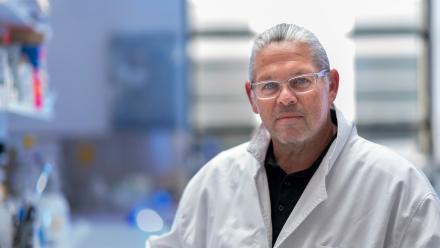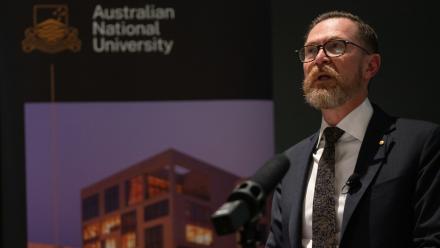ANU researchers win PM's science prizes
Both Adele and Si Ming are undertaking research that is improving our lives and our planet every day – they are scientific rock stars
Two leading researchers from The Australian National University (ANU) who are battling catastrophic climate change and killer infectious diseases are winners in the 2022 Prime Minister's Prizes for Science.
Dr Adele Morrison has won the 2022 Malcolm McIntosh Prize for Physical Scientist of the Year. The award recognises her research on the Earth's complex system of ocean circulation and its impact on rising sea levels and climate.
Professor Si Ming Man has won the 2022 Frank Fenner Prize for Life Scientist of the Year for his world-leading work on immunology and infectious diseases, and especially how inflammation impacts disease and our health.
Dr Morrison, a physical oceanographer, uses innovative methods to model Southern Ocean circulation. Her high-resolution modelling examines how the changing ocean impacts the rate Antarctic ice sheets are melting and their contribution to sea-level rise. The findings will help Australia guard against the future impacts of climate change.
"My work using high-resolution modelling has helped us to unravel the complex dynamics of upwelling circulation in the Southern Ocean and how it will respond to climate change," Dr Morrison said.
"To receive the Malcom Macintosh Prize for Physical Scientist of the Year is an amazing honour and a great opportunity to raise awareness of important issues like climate change.
"I hope my work can inspire the next generation of scientists to unravel new discoveries and technologies that limit the impacts of climate change and advance our transition to a zero-emissions world.
"For me personally, as a parent, I hope I can be a role model to show young women that it is possible to have a wonderful life both inside and outside of science."
Professor Man's work on the human immune system and infectious disease has made significant contributions to his field as well as improved health outcomes for patients in Australia and abroad. His research could shape the way we treat inflammatory diseases and cancers in the future.
Professor Man has partnered with industry leaders and fellow scientists to give his discoveries a practical application, including working on a new class of antimicrobial drugs that could improve the global issue of antibiotic-resistant bacteria. He is also leading two clinical studies into the roles of immune receptors in early diagnosis and personalised therapy for bowel cancer patients.
"Based on our research into inflammation, we can harness the most active parts of the immune system and turn them into drugs," Professor Man said.
"We found that these drugs are very effective at killing harmful germs. It's like taking an ordinary wooden hammer and turning it into a stronger and more powerful metal hammer that can destroy and break down harmful germs.
"Our research makes a significant impact in improving the quality of our lives, especially for people in our community who are at the greatest risk of catching an infection, like children. I'm really excited that our work extends beyond medical research to help find solutions to combat diseases affecting our agricultural and food industries.
"It is an incredible honour to be a recipient of the Frank Fenner Prize for Life Scientist of the Year. It will continue to inspire me and other young scientists to dream big and to take risks with our research to solve big problems."
ANU Vice-Chancellor and Nobel Laureate Professor Brian Schmidt said Dr Morrison and Professor Man were two of Australia's "finest and most impressive scientists".
"Both Adele and Si Ming are undertaking research that is improving our lives and our planet every day - they are scientific rock stars. Their unrivalled work is making a massive difference in some of the most critical areas we face: climate change and disease," he said.
"With 85 per cent of Australians living on the coast, Adele's work will help us better prepare for the impact of potential future sea level rises. Her contribution to safeguard Australia cannot be understated.
"Si Ming's work is advancing our understanding of inflammation and working on new therapies for major killers like cancer. This is saving lives.
"On behalf of our entire community I congratulate Adele and Si Ming on this well-deserved honour and recognition. They represent the very best of Australian science and the constant excellence of ANU. We couldn't be prouder of and happier for them."
The Prime Minister's Prizes for Science are Australia's most prestigious awards for outstanding achievements in scientific research, research-based innovation and excellence in science teaching. They are a tribute to Australia's world-class science community and the critical role they play in inspiring the next generation of Australian scientists and innovators.


